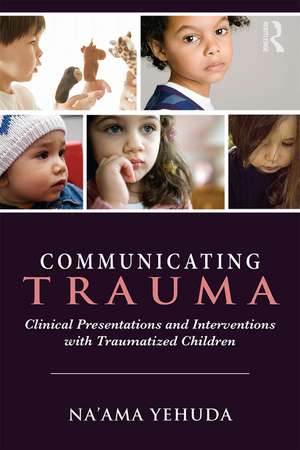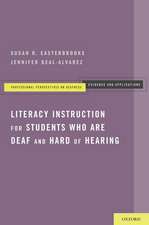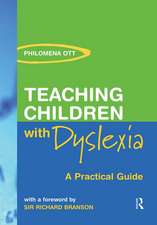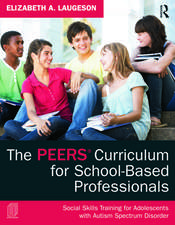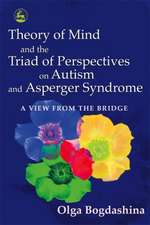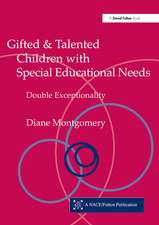Communicating Trauma: Clinical Presentations and Interventions with Traumatized Children
Autor Na'ama Yehudaen Limba Engleză Paperback – 9 sep 2015
| Toate formatele și edițiile | Preț | Express |
|---|---|---|
| Paperback (1) | 295.41 lei 6-8 săpt. | |
| Taylor & Francis – 9 sep 2015 | 295.41 lei 6-8 săpt. | |
| Hardback (1) | 1165.87 lei 6-8 săpt. | |
| Taylor & Francis – 25 sep 2015 | 1165.87 lei 6-8 săpt. |
Preț: 295.41 lei
Nou
Puncte Express: 443
Preț estimativ în valută:
56.53€ • 61.39$ • 47.49£
56.53€ • 61.39$ • 47.49£
Carte tipărită la comandă
Livrare economică 22 aprilie-06 mai
Preluare comenzi: 021 569.72.76
Specificații
ISBN-13: 9780415743105
ISBN-10: 0415743109
Pagini: 260
Dimensiuni: 152 x 229 x 25 mm
Greutate: 0.36 kg
Ediția:1
Editura: Taylor & Francis
Colecția Routledge
Locul publicării:Oxford, United Kingdom
ISBN-10: 0415743109
Pagini: 260
Dimensiuni: 152 x 229 x 25 mm
Greutate: 0.36 kg
Ediția:1
Editura: Taylor & Francis
Colecția Routledge
Locul publicării:Oxford, United Kingdom
Public țintă
Professional and Professional Practice & DevelopmentCuprins
Part 1: A Brief Overview of Communication, Language, and Development 1. Infant Communication and Attachment: Reciprocity, Verbalization, and Regulation 2. Early Language Development: How Language Shapes Reality and Reality Shapes Communication 3. Socialization, Semantics, Humor, Symbolic Language, and Empathy Part 2: Trauma, Maltreatment, and Developmental Impact 4. Indirect Trauma: Medical, Intrauterine, Environmental and Societal Trauma 5. Maltreatment: Neglect and Abuse 6. The Neuroscience of Trauma, Emotional Regulation, and the Developing Self Part 3: The Language of Trauma 7. How Trauma Affects Language and Why It Matters So Much More in Children 8. Trauma’s Impact on Attention and Learning 9. Trauma’s Impact on Children’s Vocabulary and Semantics 10. Trauma’s Impact on Pragmatics: Language Use, Social Cues, and Discourse Rules 11. Trauma’s Impact on Memory, Organization, and Retrieval Part 4: When Communication Goes Awry: Clinical Presentation and Assessment Challenges 12. Communication Symptoms in Traumatized and Dissociative Children 13. History, Screening, and Assessment Indicators Part 5: Mending Meaning: Intervention Strategies, Collaboration, and the Importance of Taking Care 14. Psychoeducation and Everyday Tools for Reducing Overwhelm 15. Communication Intervention for Traumatized Children 16. The Promises and Challenges of Teamwork 17. Supporting the Supporters: Recognizing and Managing Secondary Traumatization Afterword: A Prognosis of Hope
Notă biografică
Na’ama Yehuda, MSC, SLP, is a speech-language pathologist and audiologist with over 25 years’ experience. A clinician in private practice, she consulted for the New York City Department of Education; provides international professional development and consultations on communication, language, trauma, and development; and is the author of several publications on the topic. She was elected to serve on the boards of directors of the Israeli Speech Hearing Language Association (ISHLA) and the International Society for the Study of Trauma and Dissociation (ISSTD), chaired and volunteers on taskforces and committees, and co-chairs the Child and Adolescent Committee of ISSTD. She also writes and publishes fiction.
Recenzii
"Communicating Trauma is an amazing book about traumatized children and the unique ways they express their suffering. Most importantly, it is a roadmap for healing. Written with sensitivity, care, understanding and clinical wisdom, this gem of a book is clear, accessible, and includes poignant and instructive case examples. Both professionals and parents will find invaluable help here."
—Onno Van der Hart, PhD, professor emeritus of psychopathology of chronic traumatization at Utrecht University in the Netherlands
"Communicating Trauma is essential reading for any clinician who wants to understand the wealth of meta-information and emotion banished to the shallow graves of childhood trauma. With her typical humility and incisive intellect, Yehuda elegantly spells out how the banal viciousness of early traumatic experience leaves children, adults, and psychotherapists with the burden of deciphering what is being said, sometimes without ever opening a shuttered mouth. Communicating Trauma is an able guide to creative approaches in understanding and relieving the aftereffects of both inadvertent developmental and, more sadly, ‘typical’ traumatic experience."
—Richard A. Chefetz, MD, author of Intensive Psychotherapy for Persistent Dissociative Processes: The Fear of Feeling Real
"Communicating Trauma’s most powerful contribution resides in Yehuda’s skill in providing the reader with an encyclopedic panorama of powerful and poignant vignettes that drive her messages home with clarity, and at times with unsettling force. While the book seems to be written for those who provide a wide array of services and interventions for traumatized children, I strongly recommend it as well for clinicians like me, who treat adults who suffered childhood misfortune and mistreatment. For me, reading Communicating Trauma was almost like entering a time machine and seeing my patients decades before I encountered them in my consulting room. It provided me with a profoundly eye-opening and enlightening experience I wish had been available to me when I began my work with traumatized adults."
—Richard P. Kluft, MD, PhD, clinical professor of psychiatry at Temple University School of Medicine and faculty member at the Psychoanalytic Center of Philadelphia
"Na’ama Yehuda absolutely gets it—the impact of trauma on children—and she weaves it together with captivating clinical vignettes, clear explanations of the baffling, complex behaviors that these children exhibit, and useful practices. Communicating Trauma will serve as an inspiring guide to a wide range of professionals and caregivers who work with children. Yehuda writes with deep compassion and understanding of children, enabling us to decipher their behavior and sometimes disguised communication with understanding and attunement."
—Bethany Brand, PhD, professor of psychology and Martha E. Mitten Endowed Professor at Towson University in Maryland
"Communicating Trauma is essential reading for any clinician who wants to understand the wealth of meta-information and emotion banished to the shallow graves of childhood trauma. With her typical humility and incisive intellect, Yehuda elegantly spells out how the banal viciousness of early traumatic experience leaves children, adults, and psychotherapists with the burden of deciphering what is being said, sometimes without ever opening a shuttered mouth. Communicating Trauma is an able guide to creative approaches in understanding and relieving the aftereffects of both inadvertent developmental and, more sadly, ‘typical’ traumatic experience."
—Richard A. Chefetz, MD, author of Intensive Psychotherapy for Persistent Dissociative Processes: The Fear of Feeling Real
"Communicating Trauma’s most powerful contribution resides in Yehuda’s skill in providing the reader with an encyclopedic panorama of powerful and poignant vignettes that drive her messages home with clarity, and at times with unsettling force. While the book seems to be written for those who provide a wide array of services and interventions for traumatized children, I strongly recommend it as well for clinicians like me, who treat adults who suffered childhood misfortune and mistreatment. For me, reading Communicating Trauma was almost like entering a time machine and seeing my patients decades before I encountered them in my consulting room. It provided me with a profoundly eye-opening and enlightening experience I wish had been available to me when I began my work with traumatized adults."
—Richard P. Kluft, MD, PhD, clinical professor of psychiatry at Temple University School of Medicine and faculty member at the Psychoanalytic Center of Philadelphia
"Na’ama Yehuda absolutely gets it—the impact of trauma on children—and she weaves it together with captivating clinical vignettes, clear explanations of the baffling, complex behaviors that these children exhibit, and useful practices. Communicating Trauma will serve as an inspiring guide to a wide range of professionals and caregivers who work with children. Yehuda writes with deep compassion and understanding of children, enabling us to decipher their behavior and sometimes disguised communication with understanding and attunement."
—Bethany Brand, PhD, professor of psychology and Martha E. Mitten Endowed Professor at Towson University in Maryland
Descriere
In remarkably compelling prose, Communicating Trauma explores the co-occurrence, relationships, and presentation of communication disorders and post-traumatic/dissociative disorders in traumatized children.
